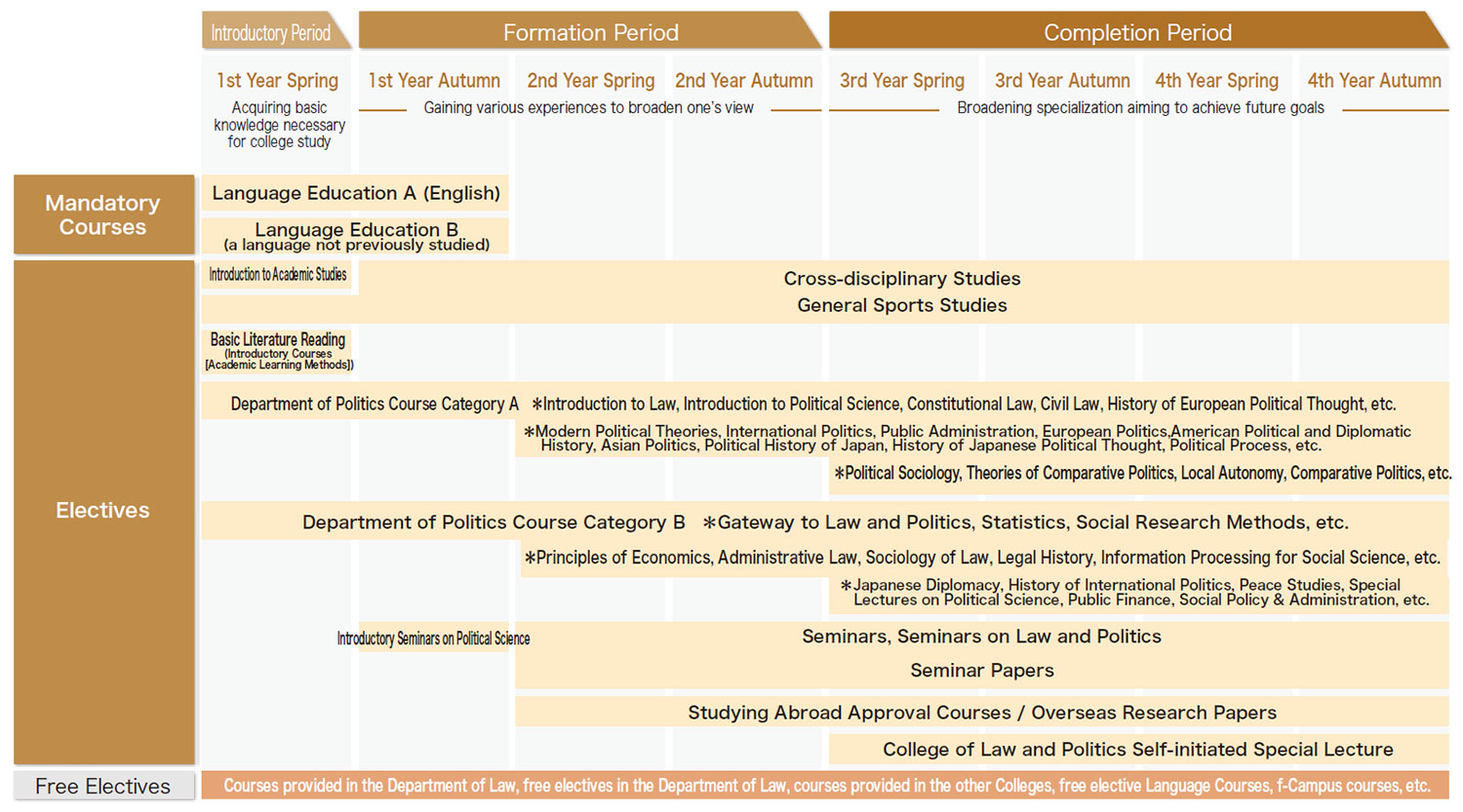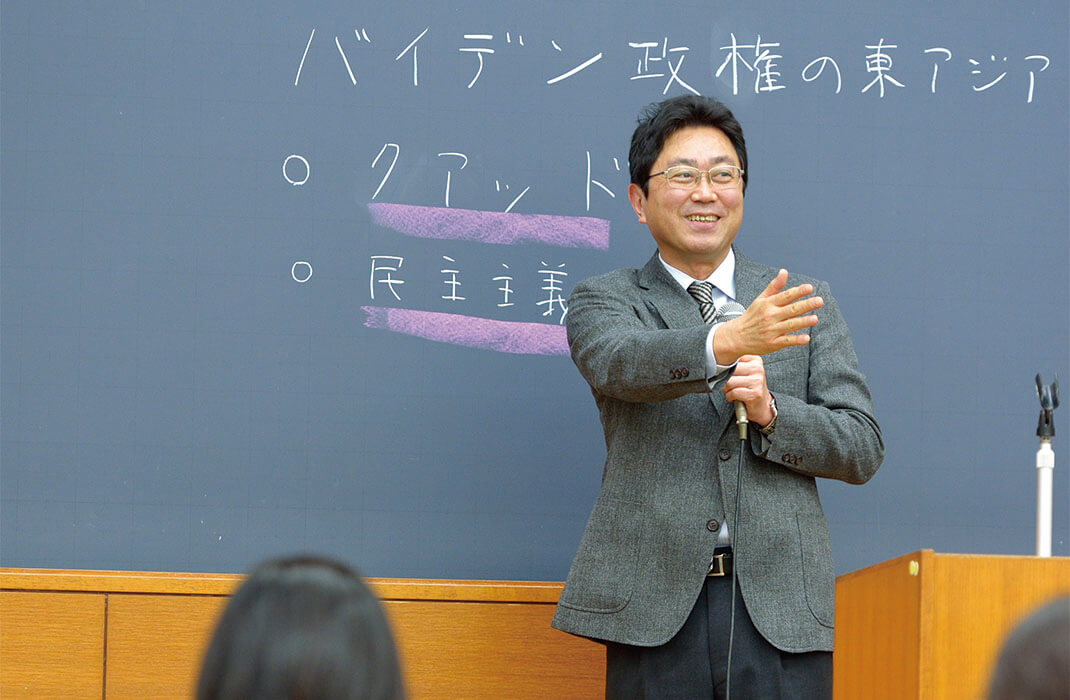Department of Politics
Develop the ability to build desirable political and social systems through learning perspectives to identify issues in politics and give proper analyses to the issues
What is the meaning of studying political science stand in the College of Law and Politics? We know that laws exist for people. However, it is people who create the laws. The value of studying political science at the College is in revealing the humanity behind the law.Various values, interests and senses of justice are embedded throughout the political process of making laws: from the elections of the members of the Diet, deliberations in the Diet, and ultimate law-making outcomes. Political science is a study of people.
Characteristic of the Department 1 / The Department of Politics values the ability to come up with questions
In the Department of Politics in the College of Law and Politics, we do not hold classes in the way of teaching the answers to problems. What we do is help students learn to come up with questions related to politics, both past and present. To formulate questions, or an act of questioning, is a crucial act that will lead to political and social changes in the next generation. Stop looking for answers on Google. Instead, we challenge you to ask as many meaningful questions as you can here at the Department of Politics. This is a“ dojo” for the intellect — welcome!
Characteristic of the Department 2 / The Department of Politics offers education that gives weight to political thought, history and evidence
The governments of different countries dealt with the COVID-19 pandemic in different ways. How effective their measures were — including those of Japan — had much to do with whether or not the country had previously experienced outbreaks of infectious diseases such as SARS and MARS. Whether or not the wearing of masks, lockdowns, or compulsory vaccinations became controversial was heavily influenced by the political ideology in each country around the idea of freedom. In the Department of Politics, we excel at examining the political history of countries, including Japan, and at empirically analyzing real-world politics while referring to the literature of Japanese and international political thought.
Characteristic of the Department 3 / The Department of Politics trains individuals to become able to design social and political systems
The Department of Politics trains creative individuals who are committed to bringing about a desirable future for our society. Individuals who study three areas — Japanese politics and political history, international politics, and political thought — become able to set questions and tasks based on a deep understanding of human behavior. Setting such questions tasks will surely lead to changes in our society. Those with the abilities to see the ideal future of our society by questioning the existing society are needed not only in politics, government or the private sector, but also in any industry. The future begins here at the Department of Politics of the College of Law and Politics at Rikkyo University.
The Department is suitable for those who wish to…
Are you one of those who feel somewhat uneasy about the thought that you have been living without thinking very deeply about things around you? For instance, are you going to select a school merely based on your academic records rather than what you wish to do, but at the same time, feeling like there is something wrong about the world you are living in, such as politics and society in general? If you are wondering what is going on in our society, why our society is the way it is, and what you can do about it, we welcome those uneasy feelings and questions at the Department of Politics! We have no sure-fire remedy to dispel uneasy feelings. However, we would like you to share those feelings with us, so we can start thinking about issues causing the feelings together. It will open up a vast and diverse academic landscape.
Four-Year Curriculum (offered in Japanese only)

Message from Academic Staff

Politics Evolving: The Potential of Politics in Europe.
Professor Ariyoshi Ogawa;Courses to teach: European Politics
Many young people in Japan perceive politics as static and resistant to change. However, in the development of European politics, things have happened that were not possible before, and nations and societies have changed. Delving into the study of European politics will not only expand your global political awareness but also provide insights into the multifarious possibilities within the realm of politics. As the world of football shows, each European region can revive a distinct identity, diverging from the conventional concept of a “nation-state.” Additionally, it is not always the case that being a“ big country” is advantageous. The world is seeing the policy initiatives of small and medium-sized countries like the Nordic countries and the Netherlands, recognized as small open economies, for their economic, welfare, and gender equality accomplishments. In the extensive history of Europe, marked by centuries of war“, European integration” signifies more than just establishing an economic community; it represents an aspiration to shape Europe into a space of peace. However, the progress of democracy and human rights in Europe has not been consistent. The challenges to democratization, particularly the slower progress in ensuring women’s participation in politics than men’s, along with the complexities of modern societal issues like fascism, widening inequality, and xenophobia in the globalized context, have unfolded as successive crises in European politics. This class aims to examine the reasons for these occurrences by delving into the political landscapes of various countries, including UK, France, Germany, Northern Europe, Southern Europe, and Central and Eastern Europe. It will also explore the European Union’s efforts at integration and intriguing political science theories to encourage fresh thinking about the broad spectrum of possibilities within politics.
